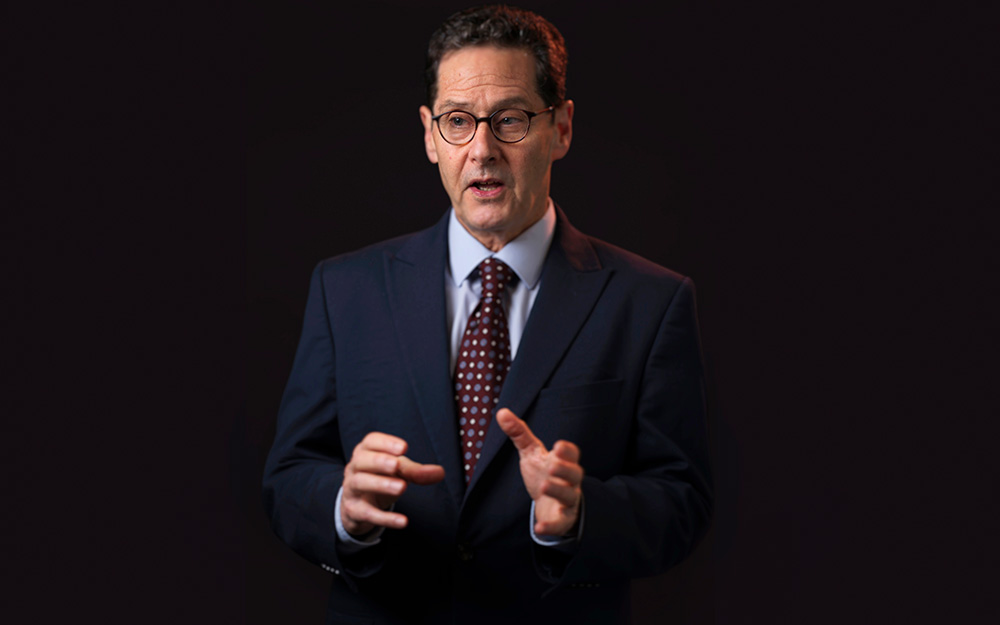Why Difficult Conversations Matter
Date
April 8, 2024
Credits

Date
April 8, 2024
Credits
Medical providers featured in this article
In Brief
{{cta-block}}
How delivering bad news with clarity and empathy impacts both provider and patient
Good physicians rely on a battery of hard-won skills to treat serious illness—they observe, predict, test, prescribe and diagnose. But many physicians haven’t been taught how to have productive, mutually beneficial conversations—such as sharing a life-changing diagnosis or informing patients about disease trajectory and symptoms, prognosis and end-of-life care.
High-impact communication tools can be learned at any point in a physician’s career, says Jessica Besbris, MD, director of Neuropalliative Care and the Neurology Supportive Care Medicine Program at Cedars-Sinai.
Here, Besbris shares why such careful conversations matter for everyone involved, and ways physicians can improve how they discuss serious illness.
"All doctors should focus on quality of life and have empathetic conversations throughout the shifting course of a person’s illness."
As a palliative neurologist, how are you uniquely equipped to communicate with patients?
I received specialize training to provide medical care that prioritizes what is most important to people with serious neurological illnesses, many of which are not curable. My niche is to help these patients decide how to navigate care decisions and plan for the future. I have permission to make quality of life my entire agenda.
As important as this focus is for specialists like me, there is an element of primary palliative care in all good medical care. All doctors should focus on quality of life and have empathetic conversations throughout the shifting course of a person’s illness.
From the Newsroom: Cedars-Sinai Neurologists Share Latest Science at Annual Meeting
What type of palliative training do neurologists receive?
As of 2019, the Accreditation Council for Graduate Medical Education (ACGME) requires neurology residents obtain basic medical knowledge of palliative care, including adequate pain relief, psychosocial support and counseling for patients and families. Their guidelines say, “Residents must learn to communicate with patients in order to partner with them to assess care goals, including, when applicable, end-of-life goals.” This is an improvement from previous requirements, but it falls short of what we hope to see. There are no instructions for how to formalize training or how to measure knowledge, and it’s not standardized across residency programs.
My colleagues at the American Academy of Neurology and I recently developed a Neuropalliative Care Core Curriculum, which we hope will serve as a guide to other residency programs for how to incorporate neuropalliative principles into training to meet ACGME requirements. At Cedars-Sinai, we’ve implemented a particularly rigorous curriculum: Neurology residents are required to do a two-week clinical rotation in neuropalliative care, attend up to 10 hours of neuropalliative lectures each year, and practice communication skills in simulated patient encounters. Training is better now, but we could be doing more, especially to educate practicing neurologists who graduated before the new ACGME guidelines were implemented and may have received limited formal communication training.
How do patients benefit when physicians are skilled in serious illness communication?
Clinicians can feel uncomfortable about having conversations about future planning or prognosis because they worry about causing patients distress, and can default to focusing on more emotionally neutral topics like disease-directed therapies. But patients with serious neurological illness are going through something, whether we name it or not—they know their disease is affecting their lives and they can feel the changes in their bodies.
Studies show that discussions about serious illness with their providers reduce patients’ anxiety and depression. When patients and families feel like your office is a place where they can be heard, they’re more likely to share symptoms, which provides better opportunities for doctors to intervene. When patients can get an accurate understanding of what their diagnosis is, they have a better chance to adapt and adjust. When patients feel like they’re partnered with their clinicians, they’re more likely to adhere to treatment because they know doctors are making recommendations that align with their goals. When people understand what is possible in the course of their disease, they’re more likely to follow medical recommendations and avoid treatments that won’t help them. All of that adds up to someone who is happier with the care they’re getting.
How do the conversations benefit physicians?
It’s really easy to talk ourselves out of having these conversations—they take up a lot of time and elicit emotional responses. Prognosis is not always certain, which can make it hard to set expectations about the future. But we see that clinicians feel better when they have good rapport with their patients. When they feel they understand and are advocating for what is important for that patient, they’re happier in their job.
Over the years, I continue to be stunned and amazed by how uplifting these conversations can be. I find that frequently, even when we are talking about end-of-life, my patients still leave their appointments laughing and smiling. Patients tell me how grateful and empowered they are to understand their diagnosis and what to expect.
Why should physicians learn to better respond to patients’ emotional reactions?
Emotional responses are totally expected in the context of receiving serious news. Patients may wish for a miracle, ask us if we tried everything we could, or react with sadness or frustration that we can’t cure them. We want to normalize these responses and give physicians tools to respond to such things they are certain to hear at some point. Attending to emotional responses allows clinicians to demonstrate empathy, help patients and families process their feelings, and move forward in the conversation.
What are practical ways for physicians to implement better conversations?
There’s a lot of opportunity to learn by observing your colleagues and paying attention to your own lived experience in terms of what went well or what went poorly in a given conversation. Try new words or phrases to find conversational tools that feel authentic to you.
In terms of allotting the time for conversations—anyone who is seeing a patient regularly can earmark one visit every six months to a year to identify and talk about priorities. Medicare reimburses for advanced care planning conversations. This is not time away from doing your job—this is just doing your job with a slightly different focus that day. Having these conversations about diagnosis, prognosis, navigating treatment decisions and planning for the future is inherent in the job of the neurologist, and responding to the emotions that come up during these discussions is critical to partnering with patients and moving forward together.





